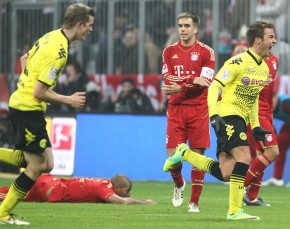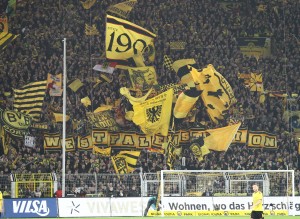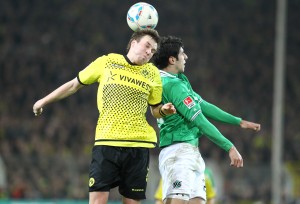
Ask the editors #1 - line-ups, Westfalenstadion and fan culture
 In our new series, the readers of schwatzgelb.com have the possibility to send in questions concerning Borussia to be answered by the editors. In the very first episode, we will discuss future line-up possibilities, the traditional home of Borussia, Westfalenstadion and some things about the fan culture. Thanks to our three readers who sent the questions used in this article.
In our new series, the readers of schwatzgelb.com have the possibility to send in questions concerning Borussia to be answered by the editors. In the very first episode, we will discuss future line-up possibilities, the traditional home of Borussia, Westfalenstadion and some things about the fan culture. Thanks to our three readers who sent the questions used in this article.
Jake from the US:
What will happen when Mario Götze is healthy again? Will he replace Kuba on the right hand side, or is it possible that Klopp decides to take Großkreutz out of the starting eleven and have a Götze-Kagawa-Kuba attacking midfield?
Even though Mario is expected to return to team training soon, I don't see him getting back to the line-up for the upcoming weeks. His injury is a serious one which sidelined Arjen Robben for months and I would not expect Mario to be back until the end of this season. Maybe we will even have to do without him for the last matches. In case of an earlier return, my guess would be that Mario will replace Kuba on the right. Even though Kuba is in an impressive shape right now and one did not hardly recognize Götze's absence, Klopp has made the same decision for numerous times in the past. With his passion and running ability, Großkreutz is hard to replace and I would also point out that Götze's strong side is not on the left.
Speaking of Kuba, I have to admit that I don't see him in the team of season 2012/2013. With a recovered Mario Götze and no personal issues concerned, Kuba will not get that much time in the starting line-up next season and rumors about a possible transfer to England keep on circulating in Dortmund. If he plays a good European Cup, I expect him to leave Dortmund in the summer.
Whose position will Reus take next season? Perhaps this dilemma will be answered by a rotational-system due to Champions League matches?
Concerning the players taking place on the bench, Borussia Dortmund already possesses one of the best qualities in the Bundesliga in my opinion. The quality of players without a spot in the starting eleven will only increase with the transfers of next season as not only Reus will join BVB, but also young talent Leo Bittencourt will arrive in Dortmund. If Kagawa stays in Dortmund next season, Reus is most likely to take the position on the left replacing Kevin Großkreutz. An offensive midfield consisting of Reus – Kagawa – Götze behind forward Lewandowski is just incredible and has no need to hide from offensive lines of FC Bayern or FC Barcelona. A rotational-system due to European competition should be considered even though we did not see much rotation last year when we played in Champions League. We will see, it will also depend on possible transfers of players who could leave Dortmund during the transfer period.
Charles (18) from Kent, England:
 The stadium was renamed Signal Iduna Park. What I would like to know is, do the majority of supporters still refer to it as the Westfalenstadion? I'm extremely opposed to stadium name sponsorship, and find it offensive towards the culture and history of football, and I think this is the ONLY negative thing about German football. I would like to hear that the Westfalenstadion's proper name has at least been continued within the fan culture?
The stadium was renamed Signal Iduna Park. What I would like to know is, do the majority of supporters still refer to it as the Westfalenstadion? I'm extremely opposed to stadium name sponsorship, and find it offensive towards the culture and history of football, and I think this is the ONLY negative thing about German football. I would like to hear that the Westfalenstadion's proper name has at least been continued within the fan culture?
Glad to tell you that supporters calling the stadium Signal Iduna Park are always corrected by other fans standing around them. Hardly anyone refers to the Westfalenstadion with the name of the sponsor due to reasons you already mentioned in your questions. Especially for Ultra supporters, the stadium was the Westfalenstadion before, is the Westfalenstadion still and will always be the Westfalenstadion. Several chants singing about standing in the Westfalenstadion and supporting the club underline that feeling and there also is a group on Facebook waiting for the day that the Westfalenstadion will get his original name back after the contract with Signal Iduna expires in 2016. When you have a closer look on the supporters on the Südtribüne, you will also find some banners about the Westfalenstadion. Even though I would not expect the stadium to get his original name back in the future, I hope (and I am pretty sure about it) that it will always be remembered as Westfalenstadion – since 1974 and forever!
The amazing Sudtribune is a weird concept to a young English football supporter, as standing at football is illegal here. What I want to know is, whether the upper blocks of the Süd (blocks 80-84) are rail-seating terraces, or the same open terrace design as the lower blocks. I have stood on Aachen's Bitburger Wall, which is open terracing, and an amazing experience, but It seems that from photos of the Süd, the upper blocks are in fact seating?
In fact, the design of the lower and upper part of the Südtribüne is different. In the upper blocks, folding seaters are attached. In the lower parts, they aren't, creating this feeling of an open terrace. However, the seaters are only "used" for European Competitions where it is a given of the UEFA that every place in the stadium must be a seater. To save time before the matches, these seaters are attached all the time even though they are not in use during the Bundesliga matches (and nobody sits on the Südtribüne during Champions League or Europa League matches as well). Giving space for around 25.000 supporters, the Südtribüne is the biggest standing terrace in Europe and something the team, fans and the club can be extremely proud of.
Zeno, American living in Dubai:
 How is Strobels related to BVB fan culture?
How is Strobels related to BVB fan culture?
The Strobels is the closest pub to the Westfalenstadion. Before and after the matches of Borussia, it is always filled in black and yellow and during the away matches, it is one of the venues for the fans who stayed at home. However, this is it basically. Strobels is not that closely related to BVB fan culture.
Does SchwatzGelb.de have any connection to The Unity?
The team of schwatzgelb.de consists of several different personalities of different ages and interests, all sharing the passion for Borussia. Some of our authors are part of The Unity, the biggest Ultra club in Dortmund, but the bigger part of the editors don't see themselves as Ulltras. We have a good connection to the leading persons of The Unity but both sides are independent.
I know he is a Dortmunder Jung, but what connection does Kevin Großkreutz have to Dortmund fans and specifically ultras?
For several years, Kevin Großkreutz was an Ultra on his own. Even when he played for Rot-Weiß Ahlen, he still travelled to Dortmund to see the matches of Borussia on the Südtribüne. He still knows many Ultras as friends and is something like a link between Ultras and the team. Therefore, he for example explained the actions of the campaign "Kein Zwanni" back in January when some supporters boycotted the match against Hamburger SV. Großkreutz told the team about the reasons and goals of the campaign and informed them about the fact that less support could be expected at the away match in Hamburg. Großkreutz is – like you already suggested – a Dortmunder Jung and always celebrated as one of them, maybe he is THE identification figure for most of the fans. He was born in Dortmund, played for Borussia during his youth and then changed teams only to come back a few years later. The story of Kevin is a great one and one of the stories only football can write since he saw the team winning the championship in 2002 and celebrated the Deutsche Meisterschaft as a player only nine years later. He embodies what has become a trademark for Borussia – real love to the city, the club and the fans.
Once again, we thank the three readers for sending in their questions. If you still have some questions on your own about anything about Borussia, feel free to send them in to vanni@schwatzgelb.de. We will collect your e-mails and answer them in a later edition of "Ask The Editors". Just make sure not to ask about ticket issues since this is a topic we already evaluated on several times. However, all other topics are welcome.
Vanni, 15.03.2012
[[$comments]]
Weitere Artikel




